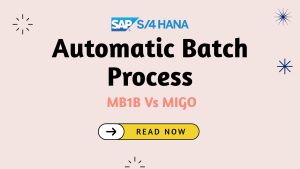SAP S/4HANA, being a comprehensive enterprise resource planning (ERP) solution, relies on the efficient execution of background jobs for various critical processes. The Technical Job Repository plays a pivotal role in automating and managing these technical jobs, ensuring smooth system operations without constant manual intervention of system administrators of SAP S/4HANA.
Table of Contents
In this blog post, we’ll delve into the concept of SAP Technical Job Repository, covering essential aspects such as authorization requirements, job scheduling parameters, step user assignment, job deactivation, error analysis, activation history, and more.
What is Technical Job Repository?
Technical Job Repository(SJOBREPO) was designed to facilitate automatic scheduling of recurring/periodic background jobs in SAP S/4HANA systems; Cloud and On-Premise environments.
Unlike the former SAP Standard Jobs found in transaction SM36, S/4HANA introduces a new approach to background job management. These jobs are now defined as workbench objects of type JOBD (job definition), integrated directly into the system’s core functionality.
These background jobs are essential to keep the S/4HANA system healthy such as deleting old spool requests. It also eliminates the need for external monitoring and intervention of system administrators, ensuring the execution of critical jobs without manual oversight.
Managing Job Definitions in SJOBREPO
The SJOBREPO transaction offers several powerful features for managing job definitions:
- Deactivation: To stop a job, you must deactivate its definition in SJOBREPO. Simply deleting the job from SM37 won’t suffice, as it will be rescheduled by the Job Repository infrastructure.
- Scope of Changes: You can choose to deactivate a job definition in the current client or across all clients.
- Customization Options:
- Modify the recurrence of time-based jobs
- Adjust report variants
- Specify target servers or groups
- Configure email notifications for job execution
It’s important to note that most modifications only apply to the current client.
Scope Dependent Technical Jobs
Scope dependent job definitions are jobs that only execute when specific conditions are met, which are defined either by a scope callback class (found in the Execution Terms tab of the job definition) or through Customizing settings. These jobs are marked with an ‘X’ in the “Scope Dep.” column and are typically scheduled in the S/4HANA Cloud environment, but may not be scheduled in S/4HANA OnPremise scenarios.
Job Scheduling Parameters
The activation of the job repository is controlled by the parameter rdisp/job_repo_activate_time, determining the time cycle for activation. The associated job, R_JR_BTCJOBS_GENERATOR, runs based on this parameter’s value, with options like 60 minutes, 2 hours, or no activation.
Authorization for Technical User
To execute all technical jobs seamlessly, a dedicated technical user with specific authorizations is required. The user should be of type ‘System,’ and its password must be deactivated. For SAP S/4HANA 1709 and beyond, it’s advisable to refer to SAP Note 2731999 for the latest authorization details, but in the SAP S/4HANA 1610, the SAP_ALL role is assigned.
Step User Assignment:
For releases lower than 7.51 SP03, the step user must be created manually in SU01 and assigned to the current client using report R_JR_UTIL_1. For releases higher than 7.51 SP03, the transaction SJOBREPO_STEPUSER simplifies the process, allowing the creation and assignment of default step users in a user-friendly manner.
Technical Job Deactivation and Reactivation
Deactivating a job in the Technical Job Repository involves using transaction SJOBREPO. By selecting the desired job and deactivating it locally, you can prevent it from being triggered. The deactivation is recorded in the table STJR_JOBD_CUST. To revert the deactivation, the process involves selecting the job again and using the appropriate option.
Using Different Report Variants:
SAP Note 2744380 provides guidance on using different report variants for job scheduling in the Technical Job Repository. This feature allows for greater flexibility in customizing job executions based on specific requirements.
Job Status Reasons:
Understanding the job status reasons is crucial for effective monitoring. Reasons such as ‘Not Relevant,’ ‘Not In Scope,’ ‘Inconsistency,’ and ‘BTC User Error’ provide insights into the execution context, allowing administrators to troubleshoot issues effectively.
Error Analysis and Reporting
Errors related to the Job Repository activation can be analyzed using transaction SLG1. The logs generated by the program R_JR_BTCJOBS_GENERATOR should be reviewed, and if errors are present, they can be reported to SAP for further assistance.
Activation History and Deactivation Monitoring:
SAP S/4HANA 1909 FPSP02 introduces changes in the activation behavior of the Technical Job Repository. The activation history can be monitored using the table STJR_HISTORY, providing insights into when and why technical jobs were deactivated or not executed.
List of Technical Jobs
To keep track of the technical jobs delivered by SAP based on the S/4HANA release, administrators can refer to specific SAP notes.
The comprehensive list of technical jobs for various S/4HANA releases can be checked in the following SAP Notes
| SAP S/4HANA 2023 | Jobs in the Technical Job Repository (SJOBREPO) in SAP S/4HANA 2023 |
| SAP S/4HANA 2022 | Jobs in the Technical Job Repository (SJOBREPO) in SAP S/4HANA 2022 |
| SAP S/4HANA 2021 | Jobs in the Technical Job Repository (SJOBREPO) in SAP S/4HANA 2021 |
| SAP S/4HANA 2020 | Jobs in the Technical Job Repository (SJOBREPO) in SAP S/4HANA 2020 |
| SAP S/4HANA 1909 | Jobs in the Technical Job Repository (SJOBREPO) in SAP S/4HANA 1909 |
| SAP S/4HANA 1809 | Jobs in the Technical Job Repository (SJOBREPO) in SAP S/4HANA 1809 |
| S/4HANA 1709, S4/HANA 1610, and S4/HANA 1511 | Jobs in Technical Job Repository |
Conclusion
The SAP Technical Job Repository is a critical component for automating and managing background jobs in SAP S/4HANA environments. Understanding its functionalities, parameters, and best practices is essential for system administrators to ensure the efficient and error-free operation of their SAP landscapes. This comprehensive guide serves as a valuable resource for anyone involved in SAP technical job management, providing insights into key aspects of the Technical Job Repository.





